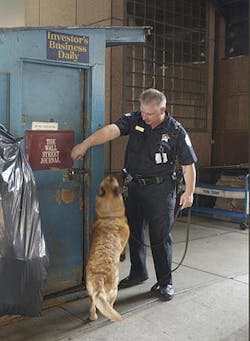Chicago-Area Police, Transit Agencies on Alert After London Explosions
CHICAGO (AP) -- Police inspected ''L'' trains and stations, river patrols checked bridges and security was beefed up at high-profile buildings Thursday as Chicago authorities reacted to a deadly series of blasts targeting London transit.
Elsewhere in the Chicago area, additional security officers patrolled the suburban commuter rail system. And in the Metro East, bomb-sniffing dogs were checking MetroLink light rail trains that travel around the St. Louis area.
Officials in Chicago stressed that there was no indication the city was a target. But about an hour after the first media reports of the London attacks, Chicago activated its joint operation center to coordinate efforts among city agencies.
The explosions in London hit three subway stations and a double-decker bus in rapid succession. At least 40 people were killed, U.S. officials said, and more than 390 were wounded.
Late Thursday morning, the Bush administration raised the terror alert a notch to code orange for the nation's mass transit systems _ something Mayor Richard Daley said the city was prepared for several hours earlier.
''I want to ensure the residents of our city that we are doing all we can to maintain the security of our city, our transportation system and other facilities,'' Daley said at a news conference at the city's emergency operations center. ''At this time we have no reason to believe that Chicago is threatened. However, we will remain vigilant in our efforts to keep our city secure.''
Both city authorities and officials with Metra, the suburban commuter rail system, asked passengers on trains and buses to alert workers or police immediately if they saw anything suspicious, such as abandoned packages or passengers acting strangely.
Several commuters reacted calmly Thursday morning to the news from London, saying that after the Sept. 11 attacks in New York City, they have known that more terrorist attacks were a possibility.
''It makes you wonder about the security you have in our transportation system, but at the same time you can't manage your life around events that you don't have control over,'' said Paul Stark, 42, of Kildeer, a business development manager taking a Metra train from the suburb of Arlington Heights to Chicago to meet with clients.
At a busy ''L'' stop in downtown Chicago that runs underneath a state government building, four police officers patrolled the area with K-9 dogs.
Brian Crummy, 32, said he was not concerned about using public transit as he prepared to board a train. He just returned from a trip to New York City over the Independence Day weekend.
''I was more worried about being in New York City on the Fourth. I don't really view Chicago as a target,'' he said.
Frank Kruesi, the president of the Chicago Transit Authority, acknowledged a public transit system as large as Chicago's is a security challenge. The system provides about 1.5 million rides every weekday and includes 12,000 bus stops, 144 rail stations, 2,000 buses and 1,200 rail cars, he said.
He said the system would become unworkable if metal detectors were installed at entry gates, of if officials tried to check packages and bags of passengers boarding trains and buses.
''Are there vulnerabilities? We just saw that in London there are. Can you take reasonable protections? Yes. Are we doing so? Yes,'' he said.
Some attacks are prevented, but not all, Kruesi said: ''And that's really the challenge. It's a very sobering realization.''
Chicago Police Superintendent Phil Cline said the increased security efforts were especially focused on transit - such as the marine unit patrolling the Chicago River paying extra attention to bridges used by the city's ''L'' trains.
He said intelligence-gathering efforts were also being expanded, and police presence was heightened downtown, including at the British Consulate. Checks were also planned at key locations such as power stations and high-visibility buildings.
Kristen Cabanban, a spokeswoman for the city's aviation department, said while the threat level hasn't been raised for airports, there was an increased visible police presence at both O'Hare and Midway, including the terminals and the stations where train lines enter the facilities.
Amtrak said Thursday it has deployed more officers and K-9 units at stations, on trains and along tracks nationwide and will remind railroad employees and passengers to be on alert for suspicious activity. Amtrak said it has no specific threat against the railroad and the tighter security is a precaution.
The Illinois State Police did not immediately increase patrols, Lt. Lincoln Hampton said. Officers have been operating at a heightened state of awareness since Sept. 11, 2001, Hampton said.
''We've asked our officers to take traffic stops one step further if they see anything suspicious,'' he said.
